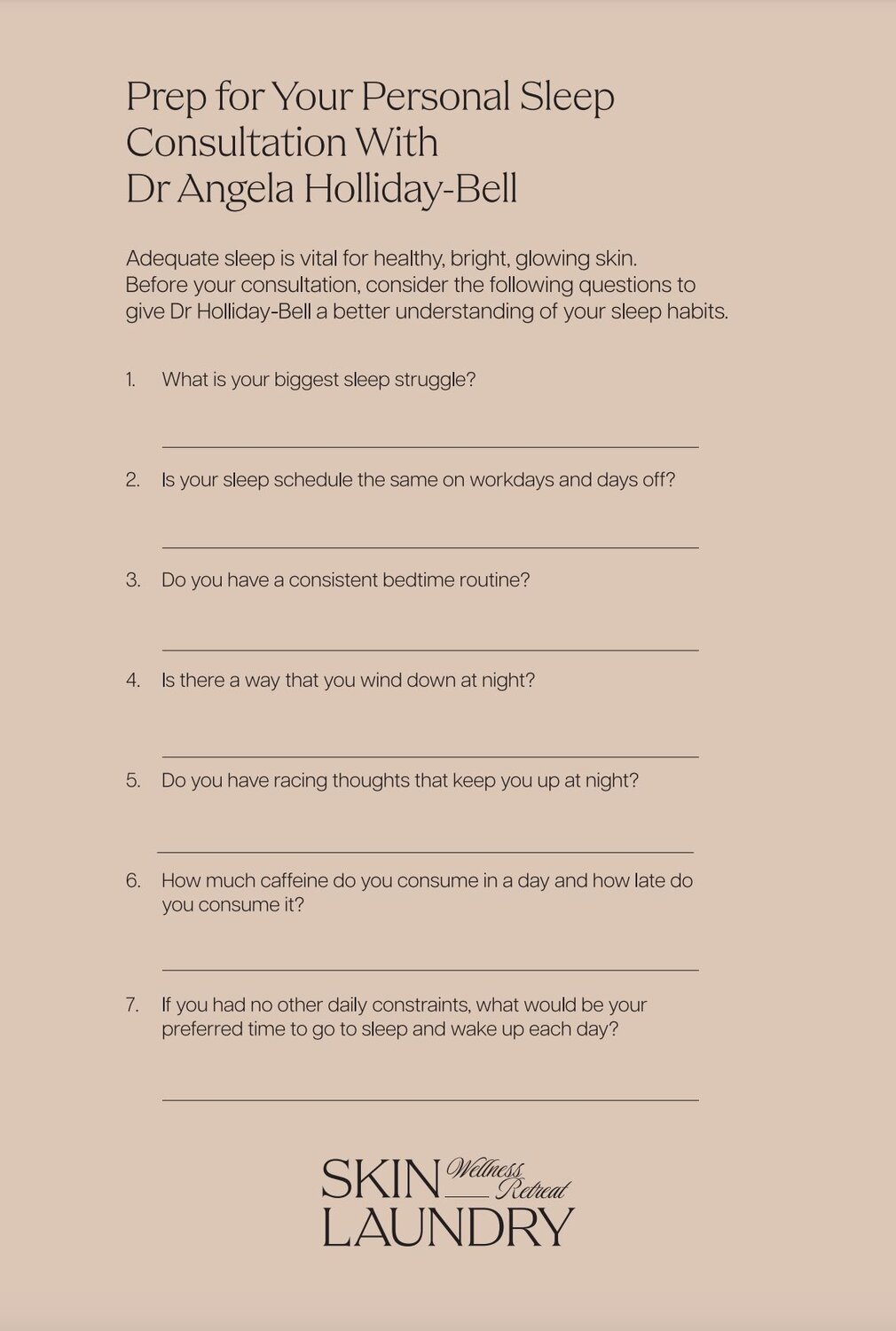
WELLBEING
How Sleep Affects Skin Health
A sleep specialist explains the link between sleep and skin health and shares her tips for achieving your best beauty sleep.
As anyone who has battled sleep deprivation knows, it can take a toll on your wellbeing, causing everything from brain fog to irritability. But poor sleep also significantly impacts our skin health.
“Sleep plays a very big role in skin health because it helps to support vital processes that need to occur, like skin-cell regeneration, collagen production and repairing damage done during the day from environmental stressors like UV rays, pollution and stress in general,” says Dr. Angela Holliday-Bell. “When you're sleeping, your body is hard at work, in repair mode.”
Holliday-Bell, a board-certified pediatrician at UChicago Medicine, certified sleep specialist and coach, and author of Sleeping on the Job, recently joined us at our Skin Laundry Wellness Retreat where she shared her insights on the skin-boosting effects of a good night's sleep, along with practical tips for falling asleep faster and establishing better sleep habits.
Read on to learn more about the connection between sleep and skin health.
Sleep plays a very big role in skin health because it helps to support vital processes that need to occur.
How does sleep benefit the skin?
When we sleep, our bodies undergo a process of repair and regeneration, including the skin. Each night, skin cells regenerate and repair the damage accumulated during the day caused by exposure to UV radiation, pollutants and other environmental stressors. Sleep also stimulates the production of collagen to help maintain the skin’s elasticity and structure. “It's those deeper stages of sleep in particular that are important for collagen production, which is the molecule that gives skin its elasticity and youthful appearance,” says Holliday-Bell.
Additionally, the body releases growth hormones during sleep, which are essential for tissue repair. Sleep is also crucial for maintaining the skin’s barrier function. When sleep is compromised, this barrier function is weakened and the skin microbiome can be disrupted. Chronic sleep deprivation can also lead to the breakdown of the delicate skin around the eyes, causing dark circles and puffiness.
A lack of sleep therefore can impair the skin’s ability to recover making it less resilient, more prone to dryness, premature aging and inflammatory skin conditions, such as acne, eczema and psoriasis.
The deeper stages of sleep in particular are important for collagen production, which gives skin elasticity.

What biological functions occur during the deeper stages of sleep?
- Skin-cell renewal: During deep sleep, the body releases growth hormones that promote skin-cell repair and renewal, contributing to smoother texture, a more even tone, and a stronger skin barrier.
- Collagen production: The release of growth factors during sleep replenishes our natural collagen supply. “Sleep is essential for collagen production,” Holliday-Bell says, highlighting its importance for maintaining skin elasticity and a youthful appearance.
- Hydration: While we sleep, the body repairs the dermal layer of the skin, which contains hyaluronic acid to keep skin moisturized. Conversely, inadequate sleep can weaken the skin's barrier function, increasing transepidermal water loss and leading to dryness.
- Better blood flow: “Sleep boosts circulation,” Holliday-Bell notes. “Rich, nutrient-dense blood nourishes the skin, giving it a healthy, youthful glow.” Lack of sleep, however, can leave skin looking dull.
- Hormone regulation: “Sleep helps regulate the stress hormone cortisol,” she explains. Insufficient sleep increases cortisol levels, leading to collagen breakdown and triggering inflammatory skin conditions like acne and eczema.
How to get better sleep
In our fast-paced world, prioritizing sleep can be challenging, but Holliday-Bell insists it’s essential. “Making sleep a priority in your life will work wonders. Many of us juggle busy days filled with work and responsibilities, and then we settle for whatever sleep we can get. It doesn’t work that way—you need to prioritize sleep.”
Once you commit to prioritizing sleep, there are straightforward strategies to enhance your sleep quality. Start by establishing consistency to support your circadian rhythm, which benefits both sleep and overall health. “Waking up at the same time each day is crucial—even more so than going to sleep at a consistent hour,” she advises. “Weekends count too! Many people trip up here, but waking up at the same time every day is one of the best ways to reinforce your circadian rhythm.”
“Another tip is to get natural light exposure, ideally within an hour of waking, to strengthen your circadian rhythm,” Holliday-Bell adds.
Waking up at the same time each day is crucial—even more so than going to sleep at a consistent hour.
How to fall asleep fast
Despite knowing the benefits of sleep for our skin and health, winding down at night can be difficult—particularly when smartphones, laptops or late-night TV is involved.
“Light is the strongest factor that influences your circadian rhythm, telling you to be awake and alert,” Holliday-Bell explains. “Blue light from screens has the strongest alerting effect on your circadian rhythm, so when you're looking at your phone, the television, or your tablet, you're telling your brain to be awake and alert. This can delay your natural melatonin release by hours and make it more difficult to fall asleep and get into the deep stages of sleep.”
Blue light can also have adverse effects on the skin, triggering pigmentation and melasma.
Blue light from screens has the strongest alerting effect on your circadian rhythm.
Consider turning off all electronic devices at least one hour before bed and try reading a book, taking a bath or doing some other type of relaxing activity instead, such as breathwork, which is one of Holliday-Bell’s favorite tools for better sleep.
To fall asleep quickly, she recommends this breathing pattern: inhale through your nose for four seconds, hold for seven seconds, and exhale through pursed lips for eight seconds. Repeat this pattern four times.
Wind-down rituals are also crucial. “Most people create bedtime routines for their kids but forget to do the same for themselves,” she says. “Engaging in a soothing bedtime routine is vital. I like to indulge in ‘me time’ before bed, with music playing, candles lit, and my skincare routine included. I usually do a devotional with my husband and then read. Research shows that keeping a gratitude journal or simply reflecting on something you’re grateful for before bed can lead to better, deeper sleep.”
In addition, studies have found that people who get seven to nine hours of sleep a night have skin that’s more moisturized and better able to protect itself from environmental aggressors such as UV light.
Take a sleep inventory
At our Skin Laundry Wellness Retreat, Holliday-Bell offered guests one-on-one sleep consultations. She encouraged attendees to assess their sleep patterns with the following questionnaire:

Doctor's Note
• Use blue light-filtering glasses two hours before bedtime if looking at screens.
• Take magnesium an hour before bed to help you relax and achieve deeper sleep.
• Wear a blackout mask to block ambient light that can interfere with sleep.
• Use a mask with built-in Bluetooth speakers to listen to sleep meditations.
• Try a weighted blanket to reduce stress hormones and boost melatonin production.
For more insights, you can view the complete discussion with Dr. Angela Holliday-Bell here.
Additional Reading
Your Shopping Bag
Your shopping bag is empty











